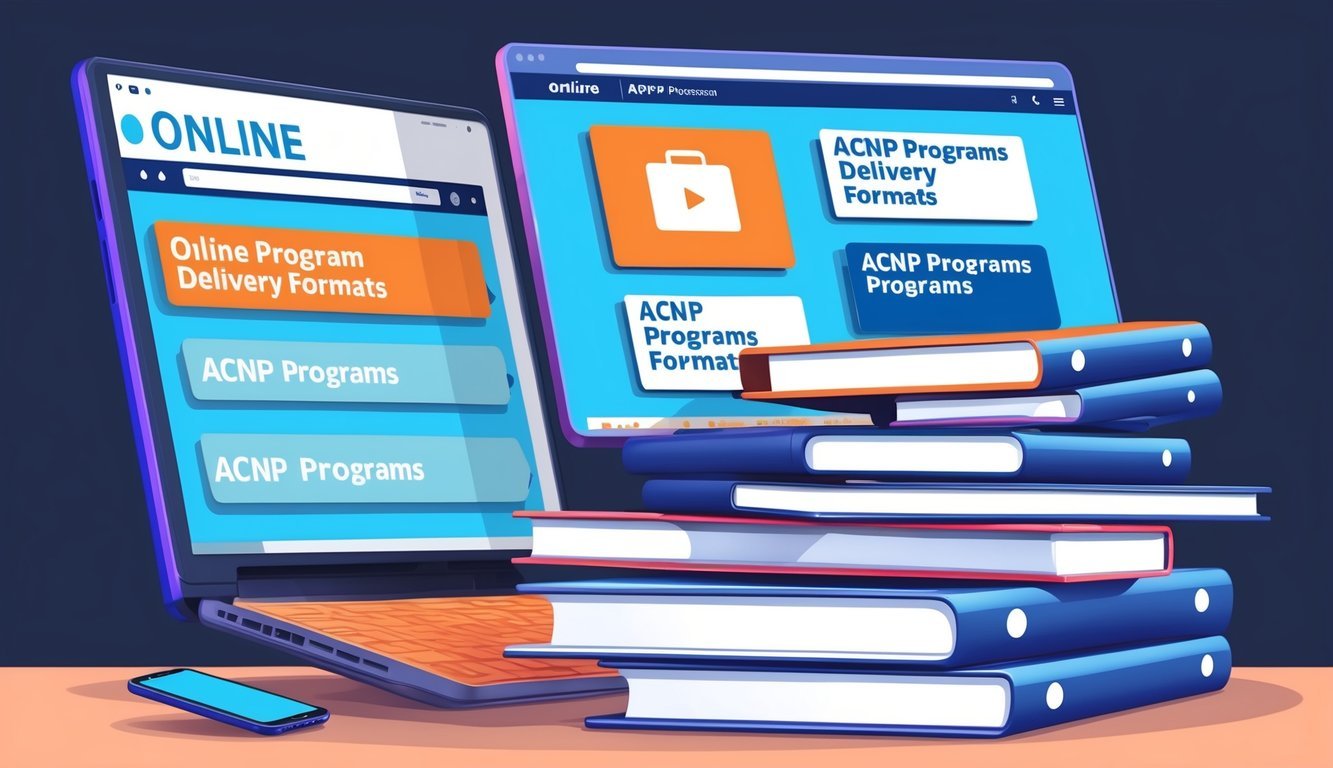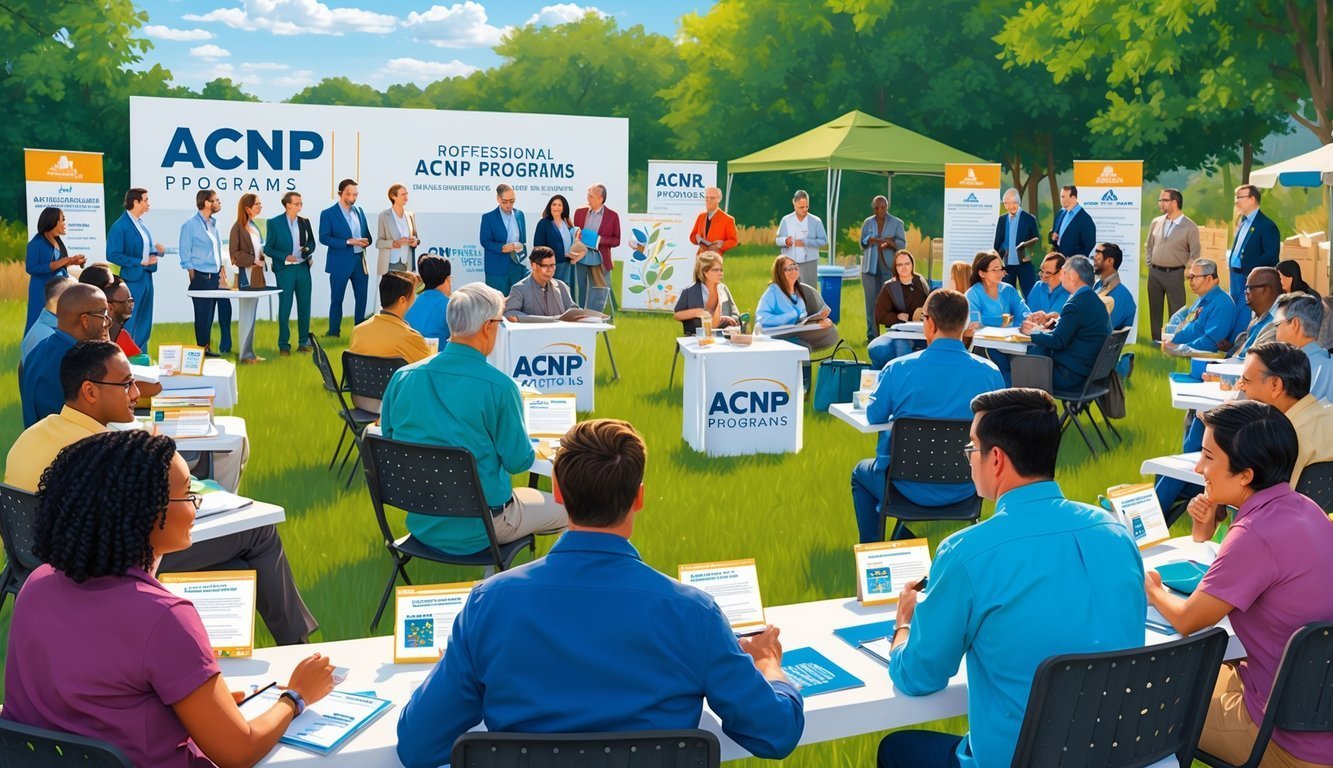Acute Care Nurse Practitioner (ACNP) programs are for registered nurses looking to specialize in acute and critical care settings. These programs equip you with the skills and knowledge necessary to diagnose and manage complex health conditions, often in high-pressure environments. As a growing field, the demand for ACNPs is increasing, making it a promising career path for nursing professionals.
When considering ACNP programs, various factors come into play, such as accreditation, curriculum, and learning format.
You can choose from online options or on-campus experiences, depending on your scheduling needs.
Programs typically lead to a Master of Science in Nursing (MSN) or a Doctor of Nursing Practice (DNP) degree, ensuring you have the credentialing required for advanced practice roles.
As you explore your options, it’s crucial to evaluate each program’s strengths and how they align with your career goals.
Resources like Nursing Process provide comprehensive comparisons of ACNP programs, helping you make an informed decision.
With the right program, you can position yourself at the forefront of patient care in acute settings.
Understanding ACNP Programs

Acute Care Nurse Practitioner (ACNP) programs prepare you to provide specialized care to patients with complex health conditions.
This section covers essential qualifications, types of programs available, and the accreditation standards that ensure quality education.
Essential Qualifications
To enroll in an ACNP program, you typically need a Bachelor of Science in Nursing (BSN).
This foundational degree is crucial, as it equips you with the necessary nursing knowledge and skills.
After obtaining your BSN, you can pursue a Master of Science in Nursing (MSN) or a Doctor of Nursing Practice (DNP) degree.
Most programs also require relevant clinical experience, often a minimum of one year as a registered nurse (RN).
You will also need to pass the required entrance examinations.
Lastly, you must complete the program to sit for certification from the American Nurses Credentialing Center (ANCC).
Types of ACNP Programs
ACNP programs can be found in various formats, each designed to cater to different learning preferences and schedules.
Key types include:
- Traditional Campus Programs: Offer in-person classes and hands-on clinical experience.
- Online Programs: Provide flexible learning options, allowing you to study at your own pace. Clinical components are typically arranged at local facilities.
- Hybrid Programs: Combine online coursework with required on-campus meetings for a balanced approach.
Programs may specialize in areas such as Adult-Gerontology Acute Care, focusing on caring for older adults with acute illnesses.
Tuition costs can vary significantly, ranging anywhere from $550 to $900 per credit hour, depending on the institution.
Program Accreditation
Accreditation is vital to ensure the quality of your education.
Look for programs accredited by recognized organizations like the Commission on Collegiate Nursing Education (CCNE) or the Accreditation Commission for Education in Nursing (ACEN).
These accreditations confirm that the program meets specific educational standards and prepares you adequately for nursing practice.
Additionally, graduating from an accredited program is often required for certification and licensure.
Verify a program’s accreditation status early in your search to ensure compliance with industry expectations.
Curriculum and Clinical Training

The curriculum for Acute Care Nurse Practitioner (ACNP) programs is designed to provide you with a strong foundation in nursing education while emphasizing critical care and specialized training.
The program includes core coursework, extensive clinical practicum hours, and opportunities for specialized training to ensure you develop the necessary skills for advanced practice.
Core Coursework
In ACNP programs, core coursework typically covers essential areas such as pathophysiology, pharmacology, and health assessment.
You will engage in classes that incorporate in-depth clinical reasoning and decision-making skills.
Key topics include:
- Advanced Health Assessment
- Pathophysiology & Collaborative Management
- Pharmacological Principles in Acute Care
Compared to traditional nursing education, this curriculum focuses on acute and critical care syndromes, allowing you to develop treatment plans for patients with complex health conditions.
The knowledge gained here is crucial for your role as an Advanced Practice Registered Nurse (APRN).
Clinical Practicum Hours
Clinical practicum hours are a vital component of ACNP programs, often requiring you to complete between 600 to 1,000 hours of hands-on training.
During these hours, you will work in various settings, including hospitals and specialty clinics.
Such diverse experiences are essential for honing your skills in real-world environments.
These clinical placements will help you:
- Gain experience in both adult and pediatric acute care
- Collaborate with healthcare teams
- Develop patient management strategies
Proficiency in these practical skills is critical for your success as an ACNP, enabling you to deliver high-quality, evidence-based care to critically ill patients.
Specialized Training
Many ACNP programs offer specialized training options, allowing you to focus on specific areas such as pediatric acute care or cardiology.
This training is often integrated into your clinical practicum, giving you the opportunity to apply specialized knowledge in a supportive setting.
Areas of specialization may include:
- Pediatric Acute Care
- Emergency Medicine
- Geriatric Care
Such focused training is increasingly important given the complexity of patient needs in critical care environments.
By pursuing specialized training, you not only enhance your skills but also increase your employment options and career advancement opportunities in your chosen area of expertise.
Program Delivery Formats

When considering Acute Care Nurse Practitioner (ACNP) programs, it’s crucial to understand the different delivery formats available.
These formats determine how you will engage with the curriculum, interact with instructors, and gain clinical experience.
Online Programs
Online ACNP programs offer the flexibility you need to balance studies with professional and personal commitments.
With distance education, you can access course materials, lectures, and assignments from any location.
Many institutions employ advanced learning management systems to facilitate interaction and support.
Features often include discussion boards, video lectures, and virtual office hours.
Here are some benefits of online formats:
- Flexibility: Study at your own pace.
- Accessibility: Attend classes from anywhere.
- Cost-Effective: Often lower tuition and commuting costs.
Notable online ACNP programs include those offered by NursingProcess.org, which highlight various accredited schools.
Hybrid Programs
Hybrid programs combine online coursework with in-person clinical experiences, providing a balanced approach to education.
This format allows you to benefit from the flexibility of online learning while engaging directly with faculty and peers.
Typically, you’ll complete theoretical components online while attending required onsite clinical sessions.
Key aspects of hybrid programs include:
- Blended Learning: Offers both virtual and face-to-face interactions.
- Hands-On Experience: Essential clinical hours conducted in person.
- Structured Schedule: Hybrid formats often have set timelines for onsite sessions.
Consider programs like the one from the University of Texas Health Science Center at Houston, which offers a well-structured hybrid pathway to becoming an ACNP.
Certification and Licensure

Certification and licensure are critical steps for becoming an Acute Care Nurse Practitioner (ACNP).
Understanding these processes ensures you meet the requirements to practice effectively and competently.
Examination Requirements
To become certified, you must pass the necessary examination.
The ACNPC-AG (Acute Care Nurse Practitioner Certification Examination) is administered by the ANCC (American Nurses Credentialing Center).
This exam evaluates your knowledge and skills in caring for adults across various healthcare settings.
Here are the primary requirements for the examination:
| Requirement | Details |
|---|---|
| Eligibility | Hold a current RN license |
| Education | Earn a master’s or doctoral degree |
| Practicum Experience | Complete required clinical hours |
| Application Fee | Approximately $395 (varies by membership status) |
Passing this certification exam indicates your proficiency and commitment to ongoing professional standards.
State Licensure
After achieving certification, obtaining state licensure is essential.
Each state has its own licensing board, which sets requirements for nurse practitioners.
To obtain your state license, consider the following steps:
- Application Submission: Complete the application through your state’s nursing board.
- Background Check: Undergo a criminal background check as part of the application process.
- Verification of Credentials: Ensure that your RN license and ACNPC-AG certification are verified.
Specific state requirements can vary, so it’s crucial to check your state board’s website for detailed instructions.
Being aware of these requirements helps you prepare adequately for a smooth licensure process.
For detailed information about ANCC certifications, you may visit their official website here.
Career and Professional Development
In the dynamic field of Acute Care Nurse Practitioner (ACNP) programs, understanding the job market, opportunities for continuing education, and involvement in professional organizations is crucial for your career advancement.
These elements not only shape your career path but also enhance your skills and network within the healthcare community.
Job Markets and Settings
As an ACNP, you have a range of employment opportunities in various healthcare settings.
The most common environments include:
| Setting | Responsibilities |
|---|---|
| Hospitals | Direct patient care, collaboration with multidisciplinary teams. |
| Intensive Care Units | Managing critically ill patients, emergencies, complex assessments. |
| Emergency Departments | Rapid assessment and intervention, trauma care, stabilization. |
The job outlook for ACNPs remains strong, driven by an increasing demand for advanced practice providers, especially in critical care settings.
According to the American Association of Critical-Care Nurses, the growing aging population and rise in chronic illnesses contribute significantly to this demand.
Continuing Education
Continuing education is vital for maintaining competency and advancing your knowledge base.
Engaging in additional certifications and training can enhance your skills in specialized areas such as:
- Cardiac care
- Pediatric critical care
- Geriatric care
Programs often focus on the latest evidence-based practices and technologies.
Many institutions offer online courses, workshops, and conferences designed to meet your needs.
The AACN provides resources and accreditation for several continuing education options, ensuring that you stay at the forefront of best practices and innovations in acute care.
Professional Organizations
Joining professional organizations can significantly enhance your career.
Membership in groups like the American Association of Critical-Care Nurses offers you access to:
- Networking opportunities
- National conferences
- Professional development resources
Such organizations often provide mentorship programs, leadership training, and resources tailored to ACNPs.
Engaging with these communities can open doors to new career opportunities and collaborative projects.
This can help you grow both personally and professionally.

